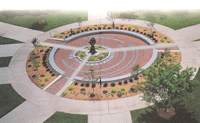
F. Hope Henderson Kelly Scott
is honored with a Medium Paver from Mary Lee Scott Esty.
Florence Hope Henderson Kelly Scott, 1899-1996, daughter of Bertha Eudora Henderson and Alva Henderson, lived through experiences that are the essence of human strength and perseverance. She remembered the covered wagon trip from Iowa to Monte Vista, Colorado in 1903, and the return trip which ended near Munden, Kansas.
She was a survivor of the world-wide flu epidemic of 1917-1918. After she recovered from the infection, she and her mother-in-law, Ida Kelly, helped the doctor nurse those who were ill. Every pregnant woman in the area died, and she played piano for every funeral during that period.
Hope was widowed the first of three times during the early days of the Depression when she had three small children. She raised her family in Wichita with her mother's help while she attended business college full-time during the day, baby-sitting for other families at night. After graduation she got a job at the Oliver farm implement company where she worked until marrying Anson Scott in 1937. They had one child, Mary Lee Scott Esty, (WU, 1960). Anson died in 1947. In 1948, Hope began secretarial work at the Kansas State YWCA, eventually becoming office manager and retiring about 1970. On her 63rd birthday she married William Mulch and they enjoyed traveling, and activities at Fairmount Community Church. At age 84, she was widowed for the third time. To avoid the Kansas winters she moved to California, near two children.
Wichita University was an important presence in her life; night classes, concerts and games were a regular part of her life, and we lived next door to Ralph Miller, the WU basketball coach. A more pervasive Wichita University presence was the evolution of our home into a home for foreign students attending WU. At one time we had students from Egypt, China, Italy and Germany. The political discussions were often heated, always interesting. This period of being their home-away-from-home began in 1953, continuing until 1972. Some of these students maintained contact with her for years, one even visiting her in California until the year before she died.
She touched many lives and hearts deeply. WU was dear to her heart and her contribution to every community was typical of her, a quiet, loving, unassuming heroine.
Submitted by Mary Lee Scott Esty, Ph.D.
July 17, 1998










